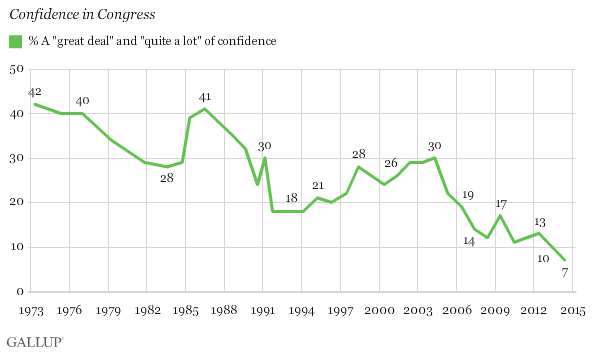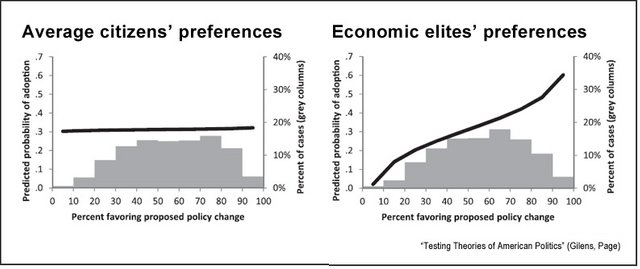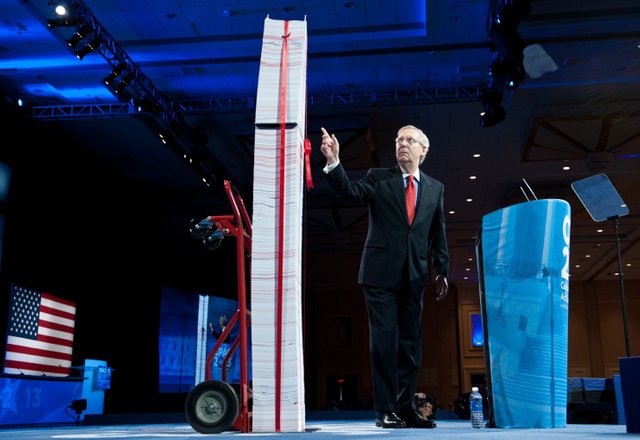Steem for the win! I don’t care who wins the white house (pt2).
Yesterday I wrote about how there are two key problems we as a society face and explained the first one: Our monetary system and why it does not do very well for what its purpose is.
If you did not read the article you can check it out here
Interestingly, @dollarvigilante also posted a similar article about the issue yesterday a few hours after mine, he focused a bit more on the fact that Nixon created the issue and called it the Nixon Shock.
@bythenumbers432 also posted an interesting article how interest rates rise due to our debt levels, which you may want to check out here
Today in the 2nd part of this little series I want to go over the other problem before turning to why I think blockchains such as steem can be a solution to all of it.
Our political systems are hundreds of years old and need an upgrade
Have you ever heard anybody say: “Man I really love how well our political system works”. No? That is probably because our system does not work very well and public approval of our governments is at historical lows, according to this Gallup research.

You can see in the chart, that if you answered the above question with yes, you are somewhat of a 7% minority.
The problem again is systemic and due to the design of how the government works.
Let us review what the purpose of a government is and then understand why in its current form it cannot be very effective.
According to the US constitution its purpose is to (http://www.archives.gov/exhibits/charters/constitution_transcript.html ):
“…form a more perfect Union, establish Justice, insure domestic Tranquility, provide for the common defense, promote the general Welfare, and secure the Blessings of Liberty to ourselves and our Posterity…”
For me personally there are two key words missing and those would be “happiness” and “prosperity” but the gist of it is pretty well outlined: The purpose of governance is to organize a society for the benefit of all its members. In the end, everything the government does should be optimized for the general well being and promote happiness and prosperity of its citizen (IMHO).
Just like with our financial system it should be a tool that makes us work together better as a social system or society. In order for this to work, it must be fair and treat every member equally and not benefit certain individuals or groups over others.
Princeton University released a study showing that there is practically no correlation between what laws are being passed and what the general public wants. The study was about the US, but I assume it is not much different in other western countries, because the systems there work pretty much the same way.

The Princeton charts show, that even if large parts of the population support legislation, the likelihood of it passing is just as low as if people do not want it to pass – roughly 20%. This is indicated by the flat bar on the left chart. On the other hand, if large parts of the economic elites do not like or do like legislation it is less or more likely to pass, shown on the right chart via the curvy line going from 0 to roughly 40%. Basically this proves that our government is corrupt. James D'Angelo explains this very well in one of his wonderful videos:
There are basically three types of governments that exist today
- Governments based upon democracy
- Government based on religion
- Government based upon a sovereign
The latter two obviously do not do so well with our purpose from above, simply because they are established to serve the religion or the sovereign. So instead of serving the society the society is made to serve them. Well done religion or Mr. Sovereign, but I hope you can do without me.
Generally, in a democracy, all power emanates from its citizens. That is the most basic democratic principle. However, in practice it is not so easy to collect the wishes of all people efficiently and translate them into laws and executive action. So back when our modern democracies were invented we came up with a way to select representatives who are supposed to represent the people that vote for them. The way we do this however was invented before the industrial revolution and pretty much has not been updated since. How can we expect a process that was designed before machines existed to work efficiently in our world today?
In addition in the US we only have a choice of two parties, so essentially there is not much of a choice and we only make it every few years.
Politicians do not get compensated well and not according to performance
Politicians get paid as long as they are in office. Usually that means for a certain amount of time, mostly 4 years, sometimes 6. Of course they want to be re-elected otherwise they will be out of a job, but other than that, there is not much incentive to do a job well. Also the pay they receive is usually quite low, compared to other high position in our society. So politicians pretty much only get feedback every 4-6 years, which alone I find a bit un-efficient. Due to their low compensation, smart people are much more likely to look for other professions than becoming a Politician, unless there are other ways they can get compensated or their position can profit their other income streams.
- So we likely do not have the brightest of our people running the government
- We don’t leverage modem technology to let our representatives know what we want them to do
- We reward politicians before doing their job, which leads to more promises and less deliveries
So overall this does not seem to be designed very well. That said I do not think that these are the main reason why politicians are so bad at doing what their people want. These things have not changed recently, so how come the approval rates went down so hard since the 70's again.
Votes need to be private to be effective
One of the key reason of the corruption in our system is that all votes in congress are public. By the way this was changed at a similar time when our financial system was changed, under Nixon in 1970. I do not think this is a coincidence but that is a topic of a different article.
If votes are public it is easy to buy them or coarse someone to vote a specific way, because the action can be verified. This makes lobbying very effective, because one can lobby a specific politician to vote a certain way and then verify if he or she voted as promised. Coercion works the same way except punishment is used instead of a reward.
Consequently, lobbyist spending has been in a pretty steady uptrend since the 70’s.
In my view our political system is basically legalized corruption, which we call lobbyism. It has many rules and regulations, but the fact is that politicians don’t have much power other than issuing laws and get paid lousy for it. We are legally allowed to give them money in form of lobbyism to make them pass laws we want them to pass. If it looks like a duck and quacks like a duck its probably a duck…. Hence the results of the Princeton study.
Complexity vs Usability
Laws tend to become more and more complex. Take a look at the US constitution or the bill of rights. They are very clearly written and pretty simple to understand. Contrast that with the more modern law such as [Obama Care] (https://www.washingtonpost.com/blogs/fact-checker/post/how-many-pages-of-regulations-for-obamacare/2013/05/14/61eec914-bcf9-11e2-9b09-1638acc3942e_blog.html) or the current tax code.

Legalese becomes more and more complex. Even in my personal career at a software company I can feel how rules have become more and more bureaucratic over the last 10 years.
Contrast this with other technologies which tend to make things easier to use, by reducing complexity and increasing usability. Think about your phones and application or cars. They do more and more things automatically, while our governments laws and regulations seem to make things more and more complicated over the years.
In summary, I don’t think our government works well today. It might have been a great system when it was invented, compared to what we had before, but in these times it needs an update. Like our financial system I don't think it serves it purpose very well and weather this is on purpose or just a side effect of its design does not really matter. But until our governments change I personally try to stay away and out of its way as much as I can simply because time and effort can be spend more productive elsewhere.
Power does not just change hands
But how can either of these system change? The same way we changed the last time, from bowing to a king to having democracies.
The truth is system of power do not just change because the power they have hold them in place. Unless this power is disrupted via some significant power quake, they will stay in place.
The last time our society changed fundamentally was, when we changed from a feudal system to mostly democratic states in the western world.
Why this happened is the question we will look at in part 3 and then see what role blockchains, bitcoin and systems like steem can play.
I hope you liked this article, if so please follow and let me know any feedback you have.
Your votes are greatly appreciated and as a believer in this platform I will keep all the money I earn invested in it.
Relevant: "Unpredictable elections " http://unenumerated.blogspot.ca/2008/03/unpredictable-elections.html?m=1
Wow thank you, I was not aware of this gem!
You raise some interesting points. On the private v public issue, I want to know how my congressman votes so I can vote against him if he does something I don't like. I wouldn't mind the votes being private until say three days after the thing was voted on. I think that the more people paying attention to politics makes the system work better. Many people are uninformed because they don't care, I just talked to my cousin and she didn't even know Trump wanted to build a wall.
I am guessing that very few people pay attention to how congressmen vote. Except for lobbyist of course. Instinctively we want be able to control and have that transparency, however if votes were private then lobbyism would simply not work anymore. Imagine what that would do.
Thank you for the kind words by the way. I am sure the vigilante did not even see my article :-) If he did he coulda at least vote on it, darn!
I'm glad you posted this, I read your first article that I kind of thought dollar vigilante read and just did a different version. No proof however. But I did notice it too.
The US constitution also is designed to allow us to protect ourselves from all dangers foreign and domestic. And the study you speak of kind of links to the discussion in that the laws passed are not what the people want. And I think that the Cryptocurrency market is a good path to start breaking those walls. Unfortunately I think the government is on track to either profit from it for themselves or keep it out of the national market. What are your thoughts?
I certainly agree that crypto can brake these walls down. I think they also are starting to develop other more effective ways of governance. The issue is that its not easy to aggregate what people want. But the way we do it has not changed in 300 years.
Right, the only thing that's changed in that 300 years is the way we back our currency, went from gold and silver to federal notes. Backed by basically IOU's!
Yes. Of course there are many minor changes but the key difference is that we gave away the right to mint money from the government to private entities by establishing the FED.